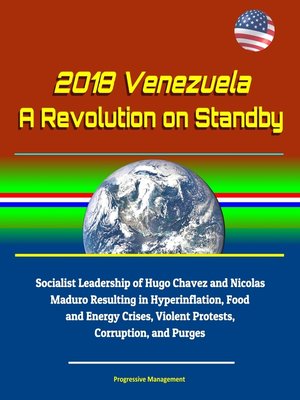2018 Venezuela
ebook ∣ A Revolution on Standby--Socialist Leadership of Hugo Chavez and Nicolas Maduro Resulting in Hyperinflation, Food and Energy Crises, Violent Protests, Corruption, and Purges

Sign up to save your library
With an OverDrive account, you can save your favorite libraries for at-a-glance information about availability. Find out more about OverDrive accounts.
Find this title in Libby, the library reading app by OverDrive.



Search for a digital library with this title
Title found at these libraries:
| Library Name | Distance |
|---|---|
| Loading... |
This excellent 2018 report has been professionally converted for accurate flowing-text e-book format reproduction.
Blessed with rich agricultural terrain, Venezuela currently retains the largest proven reserves of petroleum in the world. Surprisingly, though, the nation presently suffers from severe food and energy crises. These crises have resulted in violent protests demanding President Nicolas Maduro's ouster, yet he retains a firm grip on power. This thesis asks why. By exploring both crises, as well as President Maduro's relationship with Venezuela's elites (civilian and military leadership) and military politicization that started with President Hugo Chavez, this thesis shows the following reasons for Maduro's endurance despite the crises. Regardless of what President Maduro states regarding sabotage and conspiracies as causes, this thesis finds that Venezuela's food crisis results from over-reliance on the oil industry, lack of a developed agricultural sector, strong dependence on food imports, government-controlled food prices, and inflation; the energy crisis derives from inadequate maintenance, a lack of appropriate investments, failure to diversify sources of energy, extreme dependency on hydroelectric power, and corruption. Last, through the lens of Polga-Hecimovich's four P's, this thesis shows that President Nicolas Maduro remains in power by implementing a system of profit, promotions, allocation of political positions, and purges, and that he also retains elite loyalty through ideological indoctrination instilled by President Hugo Chavez.
I. INTRODUCTION * A. SIGNIFICANCE OF THE RESEARCH QUESTION * B. LITERATURE REVIEW * 1. Venezuela's Agricultural Sector * 2. Venezuela's Energy Crisis * 3. Coercion of Venezuela's Elites * 4. Ideology Shift and Indoctrination * 5. Potential Explanations and Hypotheses * 6. Research Design * 7. Thesis Overview and Chapter Outline * II. VENEZUELA'S FOOD CRISIS AND CONTRIBUTING FACTORS * A. RELIANCE ON A SINGLE INDUSTRY FOR REVENUE * B. DUTCH DISEASE AND FOOD IMPORTS * C. PRICE CONTROLS * D. INFLATION OF THE BOLIVAR * E. OIL REVENUE DECLINE AND MINIMUM WAGES * F. MADURO'S MEASURES AGAINST FOOD CRISIS * G. CONCLUSION * III. VENEZUELA'S ENERGY CRISIS AND CONTRIBUTING FACTORS * A. VENEZUELA'S ENERGY INFRASTRUCTURE * B. GURI DAM AND HYDROPOWER * C. ENERGY CAPACITY VERSUS CONSUMPTION * D. CORRUPTION IN THE ENERGY SECTOR * E. GOVERNMENT'S ENERGY-SAVING MEASURES * F. CONCLUSION * IV. HOW MADURO REMAINS IN POWER DESPITE CRISES * A. IDEOLOGY AND INDOCTRINATION * B. PROFITS EXCHANGED FOR LOYALTY * C. PROMOTIONS EXCHANGE FOR LOYALTY * D. POLITICAL APPOINTMENTS EXCHANGED FOR LOYALTY * E. LOYALTY OR PURGE * F. DIVIDED OPPOSITION * G. CONCLUSION * V. CONCLUSION







